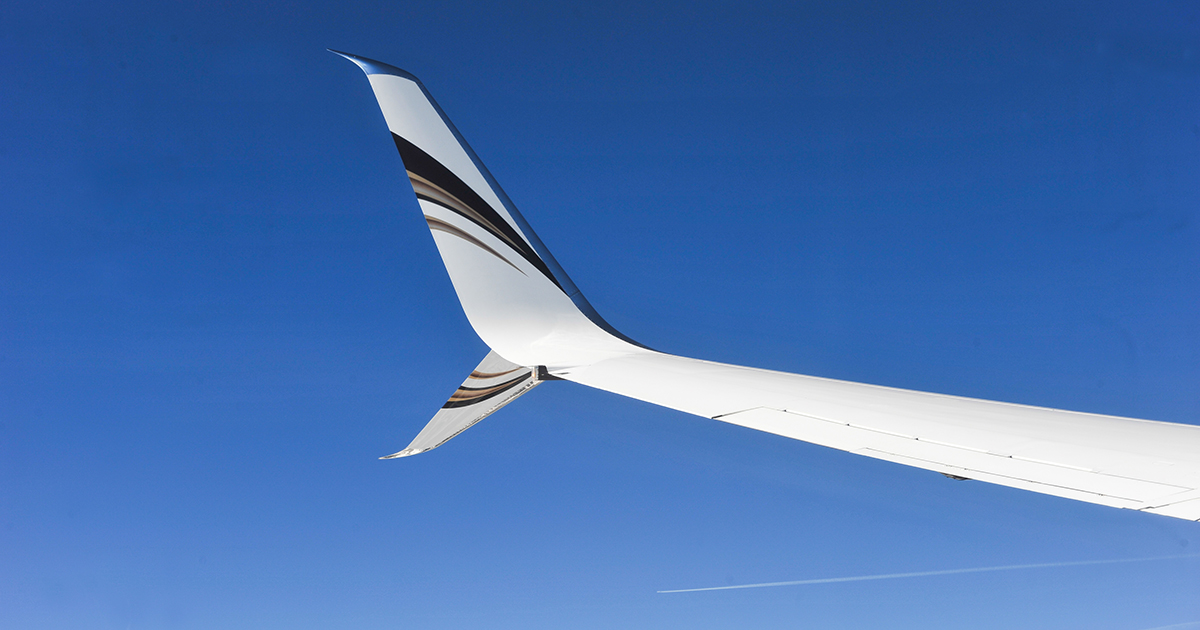The winglets we’ve produced for three decades are designed to improve performance. That means greater range, higher speeds and faster climbs for the Hawker, Falcon and Boeing jets fortunate enough to have them installed. Importantly, it also means lower carbon emissions and fuel burn – 7% less on Hawker 800s, for example.
A commitment to sustainability is woven into who we are and what we do at Aviation Partners. It’s embodied by a key metric for our Blended and Split Scimitar Winglets: Those 10,000-plus sets are estimated to have saved about 15 billion gallons of jet fuel and over 145 million tons of global CO2 emissions and counting. It’s also demonstrated by our recent investment in the sustainable aviation fuel (SAF) market and our support for business aviation.
The Facts of Business Aviation
Business jets – sometimes using the loaded term “private jets” – are often a target in global discussions of climate and sustainability, although combined with all other categories of general aviation they contribute perhaps 0.04% of total global emissions.
Aviation Partners President Gary Dunn is a vocal advocate of the business aviation industry, its benefits and its drive for sustainability. Via LinkedIn or in person with a climate activist, he works to explain how the industry is committed to reducing its impact while continuing to fuel innovation and the economy. That advocacy often involves setting the record straight and favoring facts over feelings.
“Private jets” is a limiting term, and so is “business jets” to some extent. Governments, after all, use “private jets” to transport personnel and perform other roles unsuited to larger aircraft and purpose-built military jets. But the fact is that most are used for business purposes that extend beyond toting CEOs from place to place.
The jets haul essential employees and materials to locations unserved or ill-served by airlines and do so in a timely manner. Jets are used by air ambulance companies transporting the seriously ill from remote spots to desperately needed health care. Whether saving lives or bringing in an expert team for an essential repair, jets are often the best option.
Helping Make Aviation Greener
Aviation Partners knows that our winglets contribute to business aviation’s commitment to achieve net-zero emissions by 2050. We also know that reaching that goal requires contributions on multiple fronts.
One key front is building scale into the sustainable aviation fuel (SAF) industry, considering that production needs to grow a thousandfold to reach the net-zero milestone. Financial infrastructure and resources are needed, which is why Aviation Partners has given its financial backing to Future Energy Global.
Led by an aviation finance veteran and a climate change economist and entrepreneur, Future Energy Global intends to serve as a market accelerator for the SAF industry by bringing buyers, suppliers and investors together.
Another key front involves advocating for business aviation and separating facts from fiction. The industry has a good non-fiction story to tell of innovation and progress toward greater efficiency and sustainability, one you can check out through Climbing. Fast.
More specifically, if you’d like to learn more about how our winglets can boost the efficiency and performance of the jet you’re buying or already own, contact us via www.aviationpartners.com/contact/.







